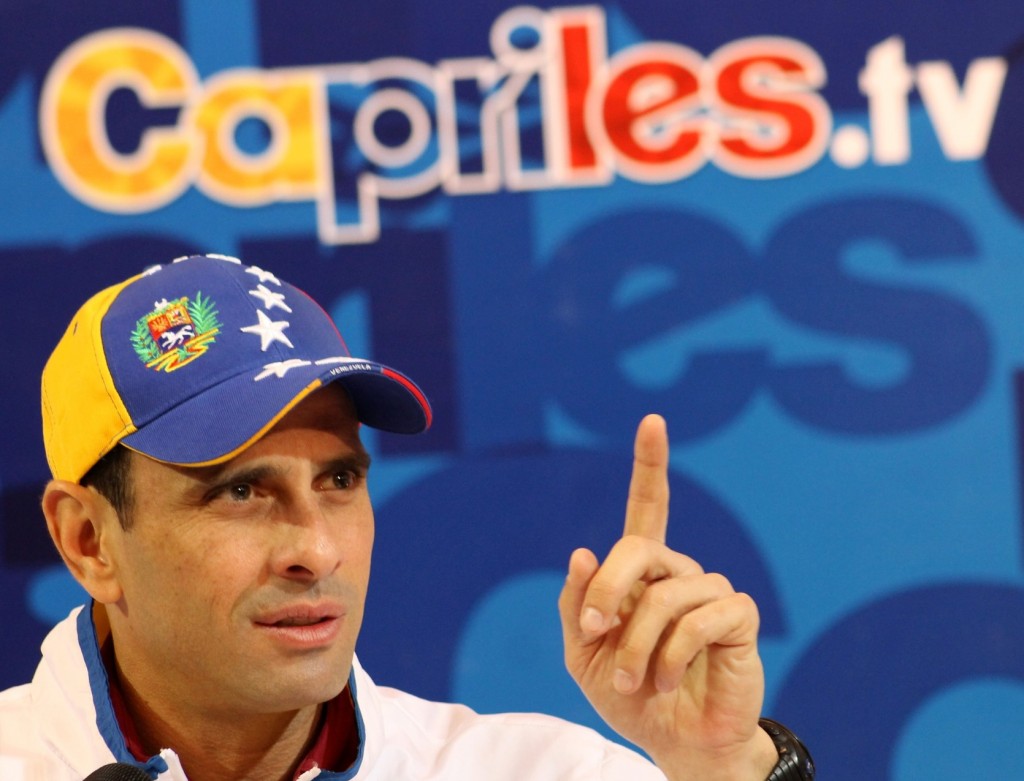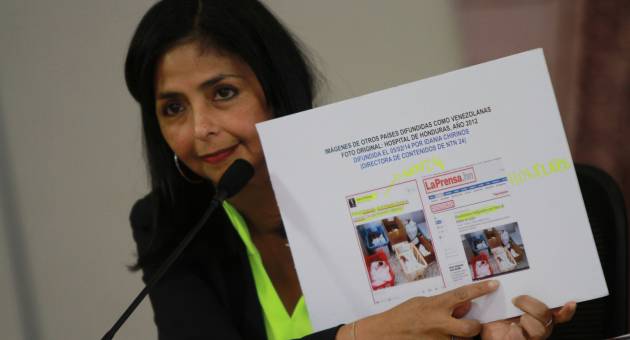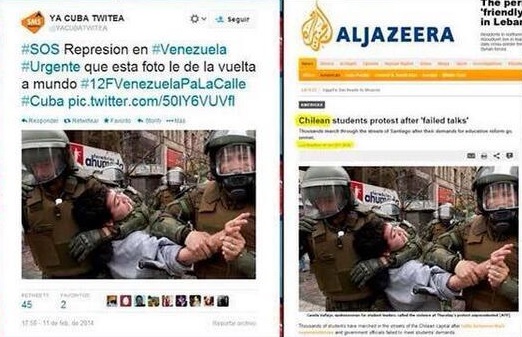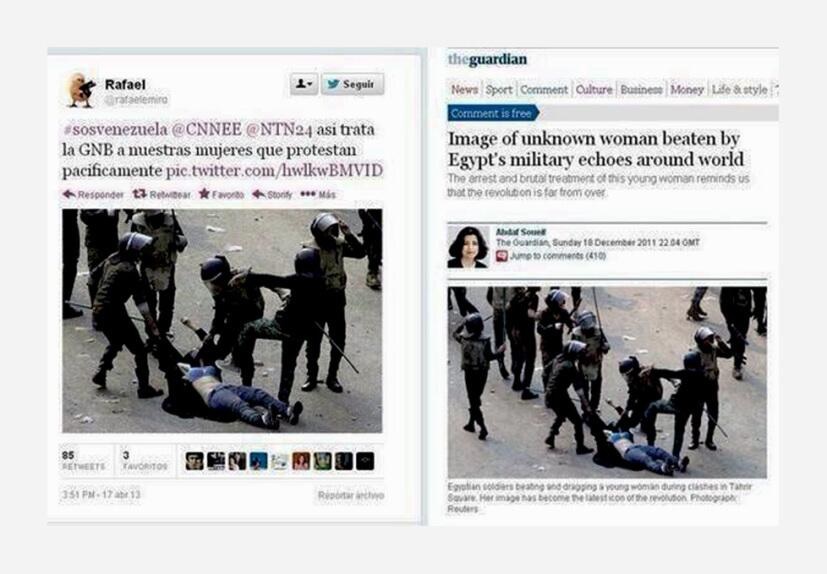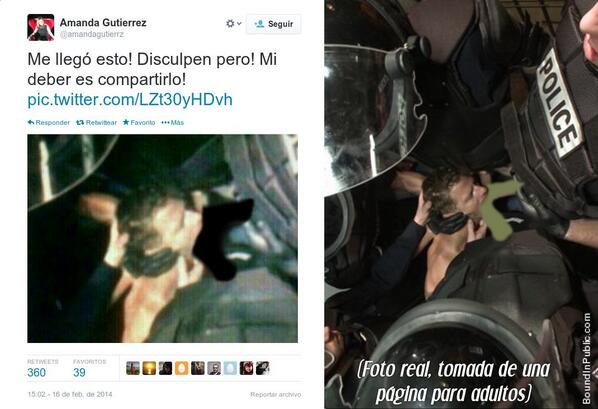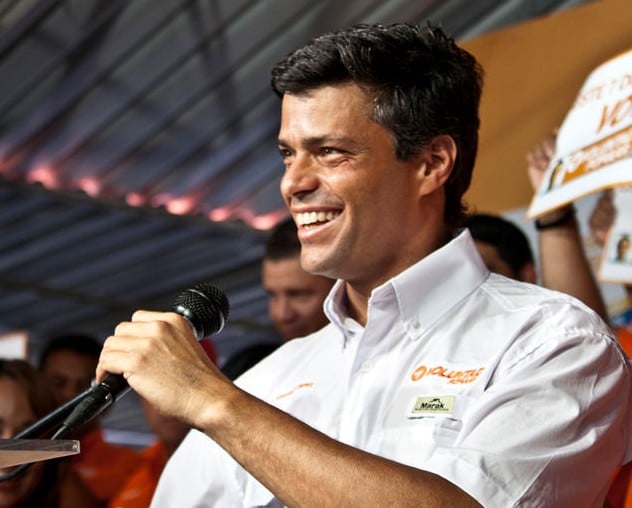Rise of the Anti-Government Flash Mobs: First Ukraine, Now Venezuela
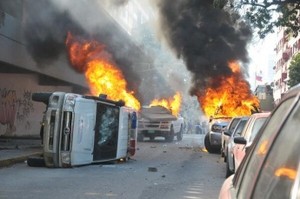
The US-supported opposition in the Bolivarian Republic of Venezuela is taking its cue from the anti-government protests taking place across the Atlantic Ocean in Ukraine. Failing to win any of Venezuela’s elections by earning a popular mandate from the majority of the population in the last few years, the leaders of the mainstream opposition are now resorting to colour revolution tactics and a Ukraine-style disruption strategy. The aim of these opposition leaders in Venezuela is to manipulate the galvanized anti-government protesters into creating a political crisis in Caracas. Mainstream opposition leaders are doing this by instigating the protesters into taking steps that are geared at toppling the Venezuelan government.
The same opposition leaders and their foreign supporters are using the cover of the undeniable misgivings about rising crime rates, political corruption, and economic turmoil in Venezuela as a disguise for what is essentially looking like an attempted coup. The socio-economic misgivings of a segment of the population are being used as a pretext to legitimize street action and violence aimed at toppling the government
It is ironic that many of those opposing the Venezuelan government in the name of democracy, equality, and security were once supporters of autocratic and openly corrupt governments before the Chavez era. Memory loss or outright hypocrisy is at play. When the same oligarch’s that form and finance the Venezuelan opposition that is supporting and instigating the current anti-government protests were in charge of Venezuela, corruption was widespread, poverty rates were much higher, inequality was greater, and there was much higher inflation. Nor was Venezuela even a functioning democracy.
Despite the Venezuelan governing party’s democratic mandate, which includes winning most the municipal seats during the country’s December 2013 elections, the US-supported Venezuelan opposition wants to use flash mobs to oust the government and to take over the country. Of the 337 mayors elected in December 2013, the final vote counts awarded 256 mayor positions to the ruling party and its coalition of pro-government forces. This amounted to a win of seventy-six percent of the mayoralties in the South American country’s municipal elections, which confirms that the majority of the population supports the current Venezuelan governing party and its political allies.
Despite their short comings, the governing United Socialist Party of Venezuela and its political allies have one of the most democratic mandates in the world. In relative terms of fair voting, the government in Caracas has much more democratic legitimacy than the governments in countries like Britain, Canada, France, and the United States, which portray themselves as champions and models of democracy. The governing United Socialist Party and its coalitions, including the Great Patriotic Pole (GPP) coalition, have gone to the poles more times and for more issues than any of the current governments in Britain, Canada, France, or the US. On any occasion where constitutional issues or major issues involving Venezuela’s political structures were being contemplated, the government and governing party let the Venezuelan voters make the decisions through popular referendums.
From 1999, the period that the Chavez era started in Venezuela, until 2014 there has been six referendums dealing with the country’s national constitution, union structures, and even an opposition motion to have President Hugo Chavez removed from office through an electoral recall at the polls. Four presidential elections, four parliamentary elections for the National Assembly, and four regional-level elections for state governors and legislatures have all taken place too. Nicolas Maduro’s election as president in April 2013, just a few months after Hugo Chavez had won the presidential elections in October 2012, reconfirmed the support and confidence that over half of the population had for the government. Moreover, not only has there been four municipal-level elections, but municipal leaders began to be democratically selected by election ballots instead of being appointed; it was the leaders of the US-supported opposition that preferred to appoint municipal leaders outside of electoral mechanisms instead of letting the people decide themselves through voting.
The Mainstream Venezuelan Opposition is Anti-Democratic
What the US-supported opposition has been trying to do is to take over Venezuela outside of electoral mechanisms. It does not care about democracy or what the majority of Venezuelan citizens want. Where the mainstream opposition leaders have failed to get popular support or to win via the ballot box, they have used trickery and every option available to them for taking over the South American country. This includes the use of force, instigation of violence, attempted coups, intense propaganda campaigns, continuous collusion with the US government, and deliberate price hikes.
The leaders of the 2014 anti-government protests are the same Venezuelan mainstream opposition leaders that supported and collaborated in the 2002 coup, executed by a small circle of military officers, that was coordinated with the US Embassy in Caracas and US Ambassador Charles Shapiro. Although the USA falsely claims any involvement, Ambassador Shapiro would quickly run to meet the coup leaders and even joyously take photographs with them after they had their soldiers kidnap President Chavez. Through access to US federal government documents under the Freedom of Information Act, it has been indisputably proven that the CIA was even given the coup’s conspiracy plans five days before the Venezuelan opposition launched their illegal and short-lived takeover of Venezuela.
The leaders of the mainstream opposition have continued to lie shamelessly since that day. Paradoxically, they have also been major benefactors of many of the democratic mechanisms of political and legal recourse that Hugo Chavez created for Venezuela as a means of increasing democratic participation and the channels of empowering people and any form of democratic opposition against the government. Mainstream opposition leaders used one of these avenues of recourse against the government in 2004 by petitioning for the removal of President Chavez, which resulted in a national referendum. The mainstream opposition leadership, however, refused to recognize the electoral results of the very same 2004 referendum that it had initiated to remove Chavez through an electoral recall by voters, just because the results were not what it wanted.
During the same 2004 referendum, the mainstream opposition leaders even tried to manipulate the Venezuelan voters and create a political crisis through a doctored recording intended to discredit the government by alleging fraud by Chavez. Their argument was fallacious, because the recording was a parody that was being circulated for months before the election. The opposition leadership merely decided to use it as an excuse to allege fraud and to delegitimize the whole referendum and the Venezuelan government.
Members of the same opposition later boycotted the parliamentary elections in 2005 after they had created an electoral crisis prior to the voting. Originally, the National Electoral Council of Venezuela wanted to use fingerprint scanners to securely register voters, but the Venezuelan opposition refused to participate if this took place. One of the reasons for the move to use fingerprint scanners was to reduce fraud or attempted fraud during elections. After the National Electoral Council backed down on its decision to install fingerprint scanners, the main opposition parties still boycotted the 2005 parliamentary elections and nevertheless tried to delegitimize the Venezuelan government.
These same opposition leaders have tried to utilize technicalities, in attempts to manipulate the law, to also take over and divide the government and its allies. When President Chavez got sick and then eventually died, the mainstream opposition forces tried to use constitutional pretexts under Article 233 of the Venezuelan Constitution to push National Assembly President/Speaker Diosdado Cabello to assume the interim presidency, hoping it would create a rift between him and Vice-President Maduro that would divide and ultimately weaken the Chavistas and the United Socialist Party.
After Nicolas Maduro won the April 2014 presidential elections, Maduro’s opposition rival from the Coalition for Democratic Unity (MUD), Governor Henrique Capriles Radonski, refused to even recognize the electoral results and unceremoniously declared fraud. With the initial support of the US government, Governor Capriles refused to accept the results even after an audit of more than half the votes was conducted through his insistence. Capriles then demanded that all the votes be recounted, which was accepted by the National Electoral Council. Capriles, however, made additional demands including a call for the full audit of the voter registry and essentially a retracing of all the votes cast (not merely a vote count). Even when the National Electoral Council with great hardship tried to meet his increasing demands and did verify that Maduro won the election fairly, Governor Capriles refused to admit defeat and said that the election was a hoax. Even the US government was forced to back down from supporting him.
After his defeat, Governor Capriles instead instigated his followers into igniting violence in the streets. US-based organizations like Human Rights Watch (HRW) totally ignored the role that Capriles and the opposition played in igniting the violence, instead taking the opportunity to criticize the Venezuelan government. HRW actually had this to say about the street violence that MUD leaders had started: “Under the leadership of President Chavez and now President Maduro, the accumulation of power in the executive branch and the erosion of human rights guarantees have enabled the government to intimidate, censor, and prosecute its critics.” Not once were the violent actions taken by the mainstream opposition or the corruption of their leaders in the states or municipalities that they administer ever mentioned by HRW.
Governor Capriles and the leaders of the mainstream Venezuelan opposition have deliberately been trying to instigate violence and a loss of human life as a tactic to delegitimize the Venezuelan government and to justify the mainstream opposition’s strategy to work outside of any democratic framework. It cannot be emphasized enough that their aims are to increase political chaos and to disrupt Venezuela’s political stability with the goal of creating a vacuum to justify acting outside of the democratic framework of elections.
The objectives of the Venezuelan oligarchs controlling the mainstream opposition are not to establish a just society or to weed out corruption and crime in Venezuela. Their objectives are to reassert and entrench their privileged positions in Venezuelan society and to undo the reforms that Hugo Chavez enacted to help the poor in Venezuela. They want the law to cater to their needs and to merely serve as a tool of enforcing their dominance. Through the major private corporations that they own they have been increasing prices. Moreover, in many cases organized crime is tied to Latin America’s oligarchs themselves.
When asked about Chavez’s legacy, many of the supporters of the mainstream opposition parties will admit that Chavez helped the poor, but emphasize that Chavez “did nothing for the country (Venezuela).” In what has the possibility of being cataloged in the psychological research on class, privilege, and perceptions of entitlement by Paul Piff of the University of California in Berkeley, this attitude exposes the psychology of entitlement that is the motivation for the mainstream Venezuelan opposition: many of these individuals (who are clearly “individuals” in the sense of being individualistic) see themselves as “the country” and exclude the Venezuelan poor from being part of the country. Thus, bridging the gap between poor and rich or improving the quality of life for the underclass citizens of Venezuela means nothing to these supporters of the mainstream opposition and does not even psychologically register as doing anything worthy to improve Venezuelan society. Only service to them and their interests can be categorized as legitimate and noteworthy.
Students Are People, They Should Not be Romanticized
The imagery of student activists has been a key characteristic of the anti-government protests in Caracas. It is worth quoting the February 14, 2014 statement of the Council on Hemispheric Affairs (COHA) about the opposition protests in Venezuela. The COHA declared that it viewed “with great alarm the violence perpetrated against the democratically elected government and civilians in Venezuela that has resulted, as of February 12, 2014, in three confirmed deaths, 61 persons wounded and 69 detained.” The COHA also noted in the same statement that the bloodshed in Caracas came “on the heels of generally peaceful marches held on the 200th anniversary of the battle of La Victoria, a battle in which students played a critical role in a victory against royalist forces during Venezuela’s war of independence.”
Students should not be romanticized as the exclusive defenders or proponents of civil liberties or democracy. Perceptions that view students this way without any assessment are romantic, wrong, and disconnected from the reality on the ground. Student groups can also represent various class and group interests that clearly contradict equality and justice in their societies or the broader world. The romanticization of students and student movements as justice-seekers merely gives these groups blank cheques and moral credit, when students and student movements should be supported on the basis of their motives and the understood causes they are promoting.
In Venezuela’s fellow Latin American country of El Salvador, medical school students from private universities doing their residencies refused to allow those Salvadorian medical school students doing their residencies that were trained in Cuba to do the same examinations as them. They fallaciously argued that the Cuban medical school standards were lower and equated the standards of education and training with the costs of the universities and medical schools. What they demanded was that the Cuban-trained doctors do an additional year of residency.
While the Salvadorian government argued that the examination results would declare who was qualified and who was disqualified, the non-Cuban medical school students resorted to protests and political tactics by blockading the examination halls and trying to disrupt the Salvadorian healthcare system instead of letting the test scores speak for themselves. These Salvadorian medical school doctors, mostly from private universities, wanted to merely eliminate their better trained Salvadorian rivals by imposing additional restrictions on their Cuban-trained counterparts by forcing them to do an extra year of residency.
The medical school protest in El Salvador was clearly a question of economic competition and personal interests and not one of justice, fairness, professionalism, or standards. If it was a question of standards, the Cuban-educated doctors were their superiors. The medical school students ultimately forced the Salvadorian government to put restrictions on the Cuban-trained medical school doctors instead of fairly settling the matter through the universal examination that all medical school graduates must do, which means they used pressure to bypass the most logical and fair means of deciding the matter. Moreover, it is worth noting that whenever the Salvadorian government has asked for doctors to volunteer their services to help in community health initiatives it has always been these Cuban-educated doctors and residents at the forefront that have offered their services and not their counterparts.
Looking back at Venezuela, it is important to identify the nature of the student involvement in the anti-government protests and to note that the students are actually divided into pro-government and anti-government camps. It is also critical to point out that the opposition leaders of the anti-government protest are hiding behind the images of the student activists to gain wider support for their objective of delegitimizing the Venezuelan government. In the words of the COHA: “While some groups of students marched in celebration of the Day of the Student, anti-government demonstrators used the occasion to protest episodic shortages of some basic goods, persistent crime, and to demand the release of students who had been arrested in earlier demonstrations.”
It is also important to point out that the faction of students that the mainstream opposition leaders are hiding behind generally comes from privileged families that can afford to send their children to private universities and post-secondary institutes of higher education. The perceptions of students in these private universities and schools can be radically different from their public university counterparts about subjects like neoliberal economics, privilege, and governing. Although proper survey work and research is needed on the matter, the students in private post-secondary institutions in Venezuela and other polarized parts of Latin America are more prone to support coups, holding different perceptions about the military being used to bring the groups that they support into power by overthrowing legitimate governments, and the unequal distribution of wealth. These types of views have been psychologically conditioned through group-think that has been hammered in by propaganda, peers, families, and the media that caters to their class and lifestyles.
Constructing False Narratives About the Anti-Government Protests and Hiding the Riots
A distorted narrative about the anti-government protests and riots is being constructed. Many of the anti-government protesters with legitimate grievances about crime and inflation themselves are being mislead by the protest leaders. As mentioned earlier, there is no denying that there is a crime problem or inflation in Venezuela, but, again, it cannot be overemphasized that the motivations of the mainstream opposition are not socio-economic grievances. These grievances are merely being used as pretexts by the opposition leaders to manipulating the protesters.
Furthermore, it must be understood that the Venezuelan opposition, in the first instance, owns almost all the mainstream media in Venezuela. The Venezuelan opposition literally has a choke-hold on most the news whereas the government only owns public television, receives support from community-based radio stations, and is allowed by law to get all the networks in Venezuela to release important public messages. In this context, the opposition leadership has used its control over the media to paint a false image of the events on the ground and to heavily distort the image of the Venezuelan anti-government protests in the minds of its grassroots followers and to whitewash the riots and acts of vandalism that have also taken place in parallel to the protests. Communication and Information Minister Delcy Rodriguez has also commented on this, saying that the government will prosecute those that are knowingly providing a cover for the violence in the streets through media distortions.
The Venezuelan opposition has been fighting a continuous propaganda war. The distortion of the anti-government protests is merely its newest chapter. The mainstream opposition is now involved in a propaganda campaign similar to the one launched in front of the Miraflores Palace in 2002 that led to the attempted coup against President Chavez. Opposition leaders pushed for violence and then when blood was spilled because of their deliberate instigation, they used the carnage to justify undemocratically removing the democratically-elected Hugo Chavez by force.
The opposition leadership has engaged in a dishonest campaign. Doctored images and false stories are being used by mainstream opposition supporters to depict the Venezuelan government as an authoritarian regime that is using brutal violence against unarmed civilian protesters. Unflattering pictures of Argentine, Brazilian, Bulgarian, Chilean, Egyptian, Greek, and Singaporean police and military forces in crowd control mode and anti-protest operations have been circulated and passed around through mass communication and social media by Venezuelan opposition forces as actions taking place in Venezuela during February 2014. This even includes pictures of government supporters that were hurt by opposition supporters and an edited photograph from a homosexual pornography video where the police are forcing a civilian to give them fellatio or oral sex which was circulated by the anti-Chavez actress Amanda Gutierrez as the brutal group raping of an unarmed anti-government protester in Caracas by the government’s riot police.
Who is Leopoldo Lopez Mendoza?
The leader of the current anti-government protests in Venezuela is also worth talking about. Leopoldo Lopez Mendoza is a former employee of Petroleum of Venezuela (Petróleos de Venezuela), S.A. (PDVSA) and the former mayor of Chacao. He comes from one of Venezuela’s wealthiest families. Lopez’s family is part of the anti-Chavez oligarchy which once ruled Venezuela like it was some sort of personal estate.
His family background or wealth alone should not be held against him, but his individual actions should. Lopez himself has no qualifications as a proponent of democracy. Lopez’s actual record says the opposite; he openly supported the suspension of democracy in Venezuela and was involved in propping the short-lived 2002 coup government in Caracas. Not only did he sign the Carmona Decree to dissolve all the democratic institutions of the country and to dismiss the judiciary and all elected officials in the executive and legislative branches of government, he was also a key figure in instigating the anti-government protests and violence in front of the Miraflores Palace that was used as a pretext to declare Chavez illegitimate.
Several years later, in 2007, Lopez and Alejandro Pena Esclusa were taped openly planning to create a political crisis in Venezuela by creating instability. Since Esclusa did most the talking, Lopez distanced himself from being Esclusa’s co-conspirator. Lopez never directly says anything in the tapes about the destabilization strategy, but his track record from 2002 and 2014 show that he has utilized it.
Lopez additionally has a record for dishonesty and corruption, which he says is fabricated by Chavez. The facts, however, speak for themselves. While Lopez was a state employee working for Venezuela’s national petroleum company, PDVSA, he had his mother, who also worked for PDVSA, divert at least $160,000 worth of PDVSA funds to him in 1998. Lopez has claimed that he did nothing wrong and merely used the money to create Primero Justicia, an opposition group. Venezuelan law, however, clearly prohibits donations from being made by the state or any of its bodies to its employees or public officials. Venezuelan law also prohibits the employees of state institutions from giving donations directly to their family members or any organizations involving family members, because of the clear conflicts of interest and risks that such acts entail.
The new Venezuelan government did not become aware of how Lopez and his mother diverted states funds during the pre-Chavez era of unaccountability until Lopez was investigated for corruption and found guilty of misusing public funds while he was the mayor of Chacao. Albeit Lopez was allowed to continue his term as mayor with intense monitoring until it finished in 2008, he was banned from running for public office until 2014 as a result of the corruption charges.
Who Perpetrated the Violence in Caracas?
2014 has arrived and now Leopoldo Lopez is up to his old tricks of instigation. Again it has to be mentioned that to justify the 2002 coup the leadership of the Venezuelan mainstream opposition made sure that there would be bloodshed and a loss of life. Lopez and his cohorts made sure that people would die by planting armed gunmen among the protesters that would start firing at the security forces. Once nineteen people died, the opposition-controlled mainstream media constructed a false narrative to sell the military coup to the Venezuelan people and the international community as a noble reaction against a government that had lost all legitimacy by killing its own people.
In this context, it is important to ask the question of who is perpetrated the violence in Caracas? Violence was instigated by armed gunmen among the US-supported opposition to justify the coup in 2002 through bloodshed. The same methodology of instigating violence has been used again in 2014. Video evidence shows at least one armed gunman instigating violence during the protests. Footage from Caracas also clearly shows that thuggery is taking place while segments of the anti-government forces are clearly instigating violence and chaos. Unarmed bystanders and civil servants have been attacked by them, including vehicles belonging to the public transportation system and their passengers. This is the same ilk that attacked public hospitals and clinics in 2013 as a means of disrupting daily life in Venezuela after Maduro took over. Moreover, Lopez’s supporters have attacked government officials and offices with baseball bats and Molotov cocktails and done everything possible to instigate fighting with the clear aim, as Lopez himself describes, of making the Venezuelan government collapse.
The same oligarchs that control most the mainstream media in Venezuela have been waging an economic war to cripple their own government and country with the aim of getting enough ordinary citizens to support their takeover of the state. Even though they are trying to portray Lopez as a maverick leader acting on his own, the oligarchs view President Nicolas Maduro as a weak leader and are seeking to use the crisis to both get concessions, either secret or public, and to amplify the internal tensions in the United Socialist Party with the aim of breaking it.
A good and bad cop strategy has been applied in Venezuela. While one faction of the opposition exerts force, the other opens a negotiating front with the government. While pressure has been exerted from the street by Lopez, Capriles begun a dialogue with Maduro. In this regard the anti-government protests in Venezuela, specifically the violent riots, have been used by the opposition as a tool to try to make the political gains that the mainstream opposition could never earn through democratic means in the last few years. In addition to demonizing a democratically-elected government, this same strategy has also been applied through the anti-government protests and riots in Ukraine.
The Geo-Strategic Challenge to the US from the Bolivarian Republic of Venezuela
The US has a major role to play in supporting all this too. There should be no mistake about this. The US government has its hands involved in the anti-government protests and riots in Venezuela, just like it has played a role in the anti-government protests and violence in both Ukraine and Syria. The US Embassy has continuously been coordinating with the mainstream opposition for the overthrow of the government in Caracas. Just like in the case of Ukraine, the US government has promoted the opposition leadership and made biased statements in their favour. Over the years, the US government has also repeatedly lied by referring to Venezuela as a dictatorship and to the mainstream opposition there as disenfranchised democrats.
Venezuela and the organizations that it has created in the Western Hemisphere are seen as major political, economic, and strategic regional threats by Washington. The Bolivarian Alliance for the Peoples of Our America (ALBA) and the Community of Latin American and Caribbean States (CELAC) are viewed as threats to the domination of the United States and competitors to the Organization of American States (OAS) and any US economic regional plans, such as the Free Trade Area of the Americas (FTAA/ALCA), for Latin America and the Caribbean. Regime change in Caracas would be the prerequisite to dismantling the Bolivarian Bloc consisting of Venezuela, Nicaragua, Cuba, Bolivia, Ecuador, the Farabundo Marti National Liberation Front (FMLN) in El Salvador, and several other actors in Latin America.
Despite the media misinformation and all the pressure on the Venezuelan economy, a large numbers of Venezuelans still continue to support the government and to vote for the United Socialist Party and its political allies. The majority of the Venezuelan population supports their government, because of the significant improvements that the Chavez era brought to their lives by increasing the quality of life for a significant amount of Venezuelans. There should be no illusions, the Bolivarian Republic of Venezuela is a deeply polarized country and still has many problems, but it became a substantially better place in the Chavez era. The Venezuelan autocrats of the past are now masquerading as democrats with the aim of just getting all their old privileges back.


